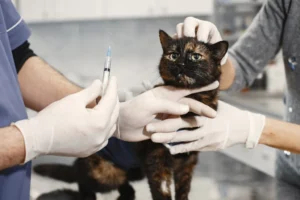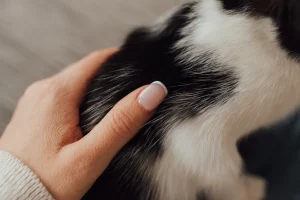Is your feline friend acting a bit off lately? Have you noticed your cat seeming disoriented and unsure of its surroundings? It can be concerning to see your usually agile and alert pet behaving strangely. In this blog post, we will explore the reasons why your cat may appear disoriented and what you can do to help them.
If your cat seems disoriented, it may be due to a variety of factors such as aging, medical conditions, stress, or environmental changes. By understanding the potential causes, you can better address your cat’s needs and provide the necessary care and attention they require. Let’s dive into the outline to explore this topic further.
As our beloved feline friends age, it’s natural for them to experience changes in their cognitive function. Just like humans, cats can develop conditions such as dementia as they grow older, which can lead to disorientation. If you notice your senior cat seeming a bit lost or confused, it could be due to age-related cognitive decline.
Additionally, older cats may also suffer from sensory deficits such as vision and hearing loss, which can contribute to their disorientation. Keeping an eye on your senior kitty’s behavior and consulting with your vet can help you understand and address any age-related issues that may be causing their disorientation.
Medical Conditions
Vestibular disease and neurological disorders are common medical conditions that can manifest as disorientation in cats. Vestibular disease affects the inner ear and can disrupt your cat’s balance and coordination, leading to a wobbly and disoriented appearance.
Neurological disorders, such as seizures or brain tumors, can also cause your cat to seem disoriented due to the impact on their brain function. It’s essential to have your cat evaluated by a veterinarian if you suspect they may be suffering from a medical condition contributing to their disorientation.
In addition to age-related issues and medical conditions, stress, changes in the environment, or even certain medications can also cause your cat to appear disoriented. By observing your cat’s behavior closely and seeking professional guidance, you can help identify the underlying cause of their disorientation and provide the necessary care and support.
Stress and Anxiety
Hey there, worried cat parent! If your furball seems a bit out of sorts, stress and anxiety could be the culprits. Just like humans, cats can get overwhelmed by changes in their environment or routine. Loud noises, new animals, or even renovations can throw your kitty for a loop and leave them feeling disoriented. To help your cat calm down, try creating a safe space where they can retreat to when things get too intense. Additionally, consider using calming pheromone products or engaging in interactive play to distract and soothe your feline friend. Remember, a little extra love and attention can go a long way in helping your cat feel more secure.
Environmental Changes
Moving the litter box to a new spot, rearranging furniture, or even adding a new pet to the family can leave your cat feeling like they’re in a whole new world. These changes can be super disorienting for your kitty, leading to confusion and stress. To help your cat adjust, try to make changes gradually whenever possible. Provide plenty of hiding spots and vertical space for your cat to explore and feel safe in. If you’re introducing a new pet, make sure to give your cat plenty of space and time to adjust to the newcomer. Remember, patience is key when it comes to helping your cat feel comfortable in their environment.
- Try to maintain a consistent routine for your cat to provide a sense of predictability and stability.
- Provide plenty of mental and physical stimulation through play and interactive toys to help your cat feel more grounded in their surroundings.
- Consider consulting with a veterinarian or animal behaviorist for additional support and guidance on helping your cat cope with environmental changes.
Remember, understanding the reasons behind your cat’s disorientation is the first step in helping them feel more secure and at ease. By being mindful of stressors and changes in your cat’s environment, you can help create a harmonious and happy home for your beloved pet.
Dietary Concerns
Is your cat feeling a bit off-balance? Well, one possible reason could be linked to their diet. Cats, just like us, need a well-balanced diet to function at their best. If their food lacks essential nutrients, it could impact their brain function, leading to disorientation. Make sure your feline friend is getting all the necessary vitamins and minerals to keep their brain sharp and focused.
Additionally, certain foods can also have negative effects on your cat’s brain. For example, toxic substances like chocolate, caffeine, and alcohol can wreak havoc on their cognitive abilities, causing disorientation and other concerning symptoms. Be mindful of what your cat is consuming and ensure their diet is healthy and free from harmful ingredients.
Behavioral Changes
Have you noticed some strange behavior in your cat lately? Changes like disorientation during playtime or sleep disturbances could be red flags for underlying issues. If your cat seems confused or lost, it might be a sign that something more serious is going on.
Pay close attention to any changes in behavior and consult with your veterinarian if you notice persistent disorientation. It could be a symptom of a neurological condition or another health issue that needs prompt attention. Your furry companion’s well-being is a top priority, so make sure to address any concerning behaviors with care and urgency.
In addition to dietary concerns and behavioral changes, here are some additional things to consider: 1. Check for any signs of head trauma or injury that could be causing disorientation. 2. Monitor your cat’s hydration levels, as dehydration can also contribute to confusion and disorientation. 3. Consider any recent changes in your cat’s environment or routine that could be causing stress or anxiety, leading to disorientation.
Providing Comfort and Support
If your cat is feeling disoriented, creating a safe and familiar environment can work wonders. Make sure they have a cozy spot to retreat to, with their favorite toys and bedding. Sometimes, adding a familiar scent like yours or a piece of clothing can provide comfort and reassurance. Soft, gentle interactions and soothing tones can also help ease their stress and confusion. Remember, patience and understanding go a long way in helping your furry friend feel secure during this time.
Interactive Play and Mental Stimulation
Keeping your cat engaged and mentally stimulated is key to reducing disorientation. Interactive toys like puzzle feeders or teaser wands can help keep their mind sharp and focused. Set aside dedicated playtime each day to bond with your cat and keep them active. Providing scratching posts, climbing structures, or even DIY cardboard boxes can offer mental and physical enrichment. Remember, a stimulated cat is a happy and less disoriented cat.
Additional Unique Insight:
In addition to traditional toys, consider incorporating food puzzles or treat-dispensing toys into your cat’s playtime routine. These interactive feeders can engage their natural hunting instincts and provide mental stimulation while rewarding them with tasty treats. It’s a win-win for keeping your cat’s mind sharp and reducing disorientation.
Interesting Fact
Did you know that cats have a superior sense of hearing compared to humans? Their ability to hear high-pitched noises allows them to detect subtle sounds that may go unnoticed to us. This heightened auditory sense can sometimes cause cats to become disoriented in noisy or chaotic environments, as they may become overwhelmed by the barrage of sounds.
This blog post will delve into the various reasons your cat may seem disoriented and offer practical tips for addressing this issue with care and compassion. Stay tuned for valuable information to help your beloved pet feel more at ease and comfortable in their surroundings.
Common Causes of Disorientation in Cats
- Health Issues: Disorientation in cats can often be a symptom of underlying health problems such as ear infections, diabetes, or neurological issues. It’s crucial to consult with your veterinarian to rule out any medical causes for your cat’s disorientation.
- Environmental Changes: Cats are creatures of habit, and disruptions in their environment such as moving to a new home, rearranging furniture, or introducing new pets can lead to feelings of confusion and disorientation.
- Aging: Just like humans, cats can experience cognitive decline as they age, leading to confusion and disorientation. This is known as feline cognitive dysfunction and may require special care and attention.
- Stress and Anxiety: Cats are sensitive animals that can easily become stressed or anxious in response to changes in their routine or environment. This can manifest as disorientation or confusion in your feline friend.
If your cat is exhibiting signs of disorientation, it’s essential to observe their behavior closely and seek professional guidance from a vet to address any underlying issues effectively. By providing a calm and stable environment for your cat, you can help them feel more secure and reduce their feelings of confusion and disorientation.
Alex, a passionate animal lover, has experience in training and understanding animal behavior. As a proud pet parent to two dogs and three cats, he founded AnimalReport.net to share insights from animal experts and expand his knowledge of the animal kingdom.









